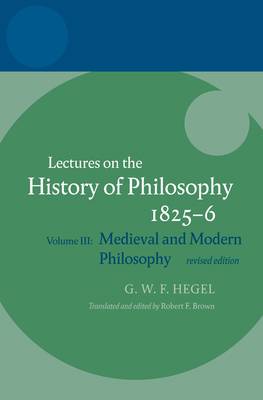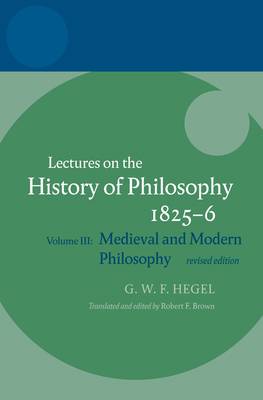
- Retrait gratuit dans votre magasin Club
- 7.000.000 titres dans notre catalogue
- Payer en toute sécurité
- Toujours un magasin près de chez vous
- Retrait gratuit dans votre magasin Club
- 7.000.000 titres dans notre catalogue
- Payer en toute sécurité
- Toujours un magasin près de chez vous
Hegel: Lectures on the History of Philosophy
Volume III: Medieval and Modern Philosophy, Revised Edition
187,45 €
+ 374 points
Description
Hegel's lectures have had as great a historical impact as the works he himself published. Important elements of his system are elaborated only in the lectures, especially those given in Berlin during the last decade of his life. The original editors conflated materials from different sources and dates, obscuring the development and logic of Hegel's thought. The Hegel Lectures series is based on a selection of extant and recently discovered transcripts and manuscripts. The original lecture series are reconstructed so that the structure of Hegel's argument can be followed. Each volume presents an accurate new translation accompanied by an editorial introduction and annotations on the text, which make possible the identification of Hegel's many allusions and sources. Hegel's interpretation of the history of philosophy not only played a central role in the shaping of his own thought, but also has had a great influence on the development of historical thinking. In his own view the study of the history of philosophy is the study of philosophy itself. This explains why such a large proportion of his lectures, from 1805 to 1831, the year of his death, were about history of philosophy. The text of these lectures, presented here in the first authoritative English edition, is therefore a document of the greatest importance in the development of Western thought: they constitute the very first comprehensive history of philosophy that treats philosophy itself as undergoing genuine historical development. And they are crucial for understanding Hegel's own systematic works such as the Phenomenology, the Logic, and the Encyclopedia, for central to his thought is the theme of spirit as engaged in self-realization through the processes of historical change. Furthermore, they played a crucial role in one of the determining events of modern intellectual history: the rise of a new consciousness of human life, culture, and intellect as historical in nature. This third volume of the lectures covers the medieval and modern periods, and includes fascinating discussion of scholastic, Renaissance, and Reformation philosophy, and of such great modern thinkers as Descartes, Locke, Leibniz, and especially Kant.
Spécifications
Parties prenantes
- Editeur:
Contenu
- Nombre de pages :
- 268
- Langue:
- Anglais
- Collection :
Caractéristiques
- EAN:
- 9780199568949
- Date de parution :
- 21-09-09
- Format:
- Livre relié
- Format numérique:
- Genaaid
- Dimensions :
- 156 mm x 234 mm
- Poids :
- 553 g






